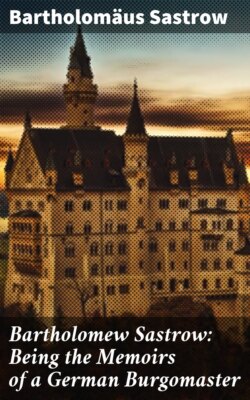Читать книгу Bartholomew Sastrow: Being the Memoirs of a German Burgomaster - Bartholomäus Sastrow - Страница 7
На сайте Литреса книга снята с продажи.
ОглавлениеBurgomaster Smiterlow was as frank in his speech as he was open of heart. When he conversed in the street his strong and clear voice could be heard a couple of yards off. All his speeches began with "Yes, in the name of Jesus." One day, after dinner, he went into his stables where, as a rule, he had three horses; he saw one of his stablemen strike one of the animals with a pitchfork, saying, in imitation of himself, "In the name of Jesus." Smiterlow snatched the implement away from him, then stuck it between his shoulders so that he dropped down, and quietly remarked: "Now and again I cause people to cry 'In the name of all the devils.'"
According to the custom of the papists, my mother went at half-past twelve, especially during Lent, to recite a Pater Noster and an Ave Maria before each of the three altars of her ordinary church. She always took her little Bartholomäi with her. On one occasion I sat down on the steps of the first altar and began to relieve nature; when she passed on to the second, I followed her and continued the operation, which I finished on the third. When my mother perceived what had occurred she rushed home in hot haste and sent a servant with a broom to repair the mischief. Seeing how young she was when separated from her husband and left with four young children, it is not surprising that my mother had moments of sadness and discouragement. One day that she was cutting up some dry fish, a piece fell from the block. I picked it up. Without noticing my mother stooped at the same time, and as I was rising, the edge of the hatchet cut my forehead. The scar was never effaced. The Lord be praised, though, the accident had no further consequence.
Hartmann's family having received satisfaction, my father appointed to meet his wife and his children at the manse of Neuenkirchen. It was in the autumn and the pears were ripe. After having shaken down and eaten as many as they could, the children began to pelt each other with them. A big pear dropped under the hoofs of a couple of horses tied to a large pear tree. When I stooped to get hold of it, one of the animals dealt me a severe kick at the temple. There was general consternation, and the wound being seemingly dangerous, we came back immediately to town, and I was taken to the doctor.
The Dukes George and Barnim came to Stralsund with four hundred horsemen; they received homage and confirmed the privileges of the city. As for the claims of the priests, it was decided to refer them to the Imperial Chamber. Burgomasters, councillors, burghers, preachers (in all about threescore), were summoned to depose on oath before the Imperial Commissioners, sitting at Greifswald. The lawsuit cost the city a considerable sum; the clergy practically flung the money away, but the rector, Hippolytus Steinwer, began to perceive that the chances were turning against them, and one day he was found dead. It was believed he had strangled himself from vexation. That event put an end to the litigation. The priests returned one after another to Stralsund.
Gradually the sobered citizens began to open their eyes to the serious prejudice which was being done to public and private interests by the agitation of Moller. On the other hand, the princes had learned to know Smiterlow during the journey to Nuremberg; they were also aware of the esteem in which he had been held by their father. All those feelings showed themselves on the occasion of the rendering of homage. Rolof Moller was obliged to leave the city, and Burgomaster Smiterlow re-entered it on August 1, 1526. Moller, after a stay of several years at Stettin, received permission to come back to Stralsund, Smiterlow giving his consent; but scarcely a fortnight after his return had gone by when he died, it was said, of grief; and the assumption was sufficiently plausible.
Hence, Smiterlow spent the time of his exile at my mother's, at Greifswald, while his house at Stralsund sheltered my father. The wives of the two banished men went constantly and at all seasons from one town to another, through hail, snow, rain, frost and cold, and also to the great detriment of their purse and their health.
I have often been told afterwards I was a restless, energetic child. I often went up to the tower of St. Nicholas's, and on one occasion I made the round of it outside. My mother, standing on the threshold of her house, facing the church, was a witness of the feat, and dared scarcely breathe until her son came down safe and skin-whole. It would appear that little Bartholomäi had his reward at her hands.
While at Greifswald I had already been sent to school. Besides reading, I was taught declension, comparisons and conjugation, according to the grammar of Donat; after which we passed to Torrentinus. On Palm Sunday I was selected to intone the Quantus; the preceding years I had sung at first the short, then the long Hic est. What an honour for the child and for the parents! It was a real feast, for as a rule the sharpest boys are chosen those who, undeterred by the crowds of priests and laymen, bring out their clearest notes, especially for the Quantus. The continuation of this story will, however, soon show how, from being sanguine, my temperament became melancholy, and how my gaiety and recklessness vanished.
